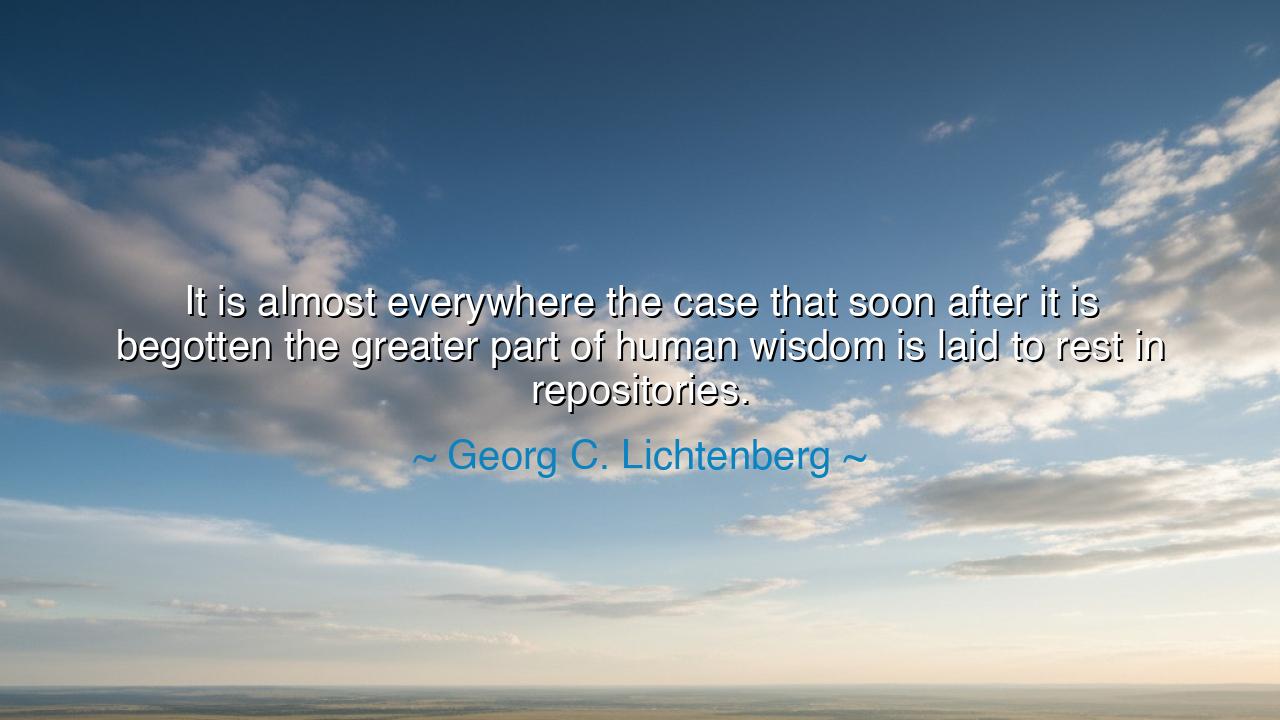
It is almost everywhere the case that soon after it is begotten
It is almost everywhere the case that soon after it is begotten the greater part of human wisdom is laid to rest in repositories.






Attend, O seekers of truth, to the words of Georg C. Lichtenberg, the contemplative sage, who observed the peculiar fate of human wisdom. He noted that often, shortly after its birth, the greater part of this luminous gift is laid to rest within repositories, hidden from the world, and veiled from those who might wield it with courage and understanding. Here lies a subtle admonition: knowledge alone, unshared and unawakened, serves little purpose. The treasures of the mind, if entombed in silence or neglected in the vast halls of archives, are like seeds buried too deeply to see the sun.
The origin of Lichtenberg’s reflection lies in his life as a German physicist, mathematician, and aphorist of the Enlightenment era. He observed the human penchant for hoarding wisdom in the form of books, treatises, and learned manuscripts, yet failing often to live by the truths they contained. In his own era, libraries brimming with knowledge stood as silent monuments, the contents of which were rarely brought to life in the hearts and deeds of men. Lichtenberg’s eye discerned the irony: that wisdom, though generated by the labor of thought, often languishes unseen, like a stream diverted into stone channels.
The meaning of this utterance pierces the very soul of human endeavor. It warns that the birth of knowledge is not sufficient; its vitality depends upon engagement, reflection, and action. To hoard wisdom without sharing, to store insight without application, is to consign it to sleep, where it may endure, yet fail to illuminate the paths of others. The aphorism teaches that true wisdom is alive only when it circulates, instructs, and transforms both the mind and the society in which it dwells.
History bears witness to this truth. Consider the ancient Library of Alexandria, whose shelves overflowed with the wisdom of ages, capturing the thoughts of many lands. Yet when flames or neglect swept through its halls, much of that knowledge was laid to rest prematurely, lost to the world for centuries. Here was a tangible illustration of Lichtenberg’s insight: brilliance, however carefully gathered, may remain inert, waiting for human hands to awaken it into useful light.
Yet take hope, for wisdom need not be forever buried. The Renaissance, centuries later, breathed life again into manuscripts, charts, and texts long forgotten. Scholars and thinkers recovered the treasures, turning the latent repositories of knowledge into engines of discovery, art, and science. This reminds us, O children of the future, that the dormant mind may be stirred by the diligent, and that the stored wisdom of the past may yet illuminate the present.
Thus, let Lichtenberg’s words serve as a guiding lantern: cherish the birth of insight, but ensure that it is not consigned to silence. Engage, share, and apply the knowledge you are granted, lest it be laid to rest without ever shaping hearts, minds, or the world. For wisdom, once generated, achieves immortality only when it is lived, taught, and passed through the generations, like a sacred flame from hand to hand.






DPNguyen Dac Phong
Reading this makes me reflect on the tension between knowledge and action. It seems that creating wisdom is only the first step; its utility depends on how it is shared and employed. I’m curious whether this ‘resting’ of wisdom is a natural part of human history, or if modern access to information has changed the pattern. Could fostering curiosity, critical thinking, and communication be the key to preventing wisdom from becoming dormant too soon?
T7Mr.Tran Trung 7B
This perspective provokes a deeper question about the life cycle of ideas. If human wisdom is quickly deposited into repositories, is this a safeguard against loss or a form of intellectual stagnation? I wonder whether cultural, educational, or societal systems encourage active engagement with knowledge, or if they inadvertently encourage passivity. How can individuals and communities retrieve and revitalize wisdom from these ‘repositories’ to make it meaningful in practical, everyday life?
TKLe Trung Kien
I feel a mixture of fascination and frustration reading this. It implies that much of what humanity learns ends up hidden, unutilized, or forgotten shortly after it is discovered. Does this mean that wisdom’s real power lies not in creation but in application? I also question how technology, with digital storage and information sharing, changes this dynamic—are we still burying wisdom, or can it now circulate more freely and reach those who can act on it?
ADank duonq
This statement makes me reflect on how knowledge is often preserved rather than actively applied. Is wisdom truly meant to be practiced, or is it primarily stored in books, institutions, and archives? I wonder whether this tendency to ‘lay wisdom to rest’ limits human progress, as insights may exist but remain unused or inaccessible. How can societies ensure that knowledge is not just preserved but actively informs decisions and inspires innovation?